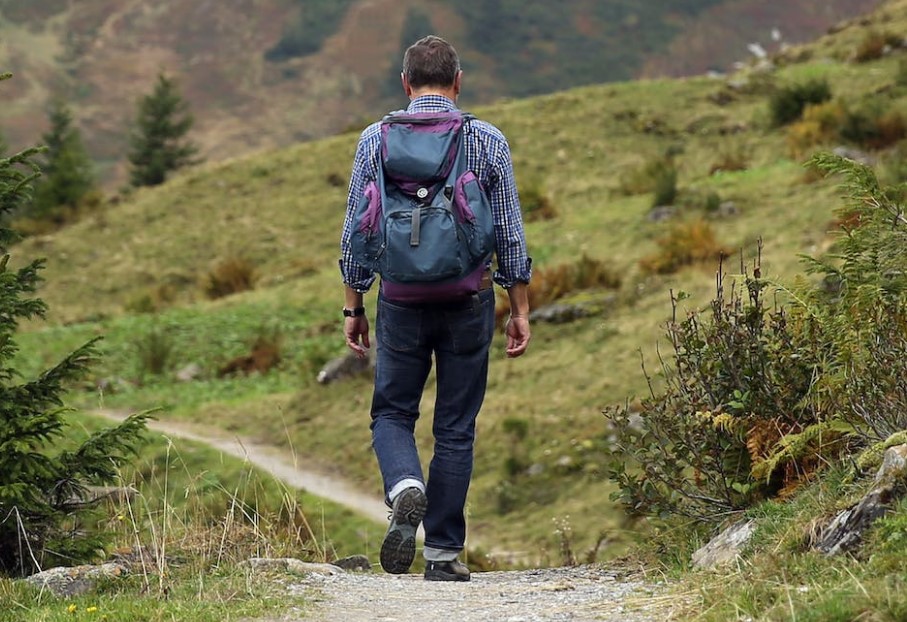Benefits of Hiking: A popular outdoor activity that involves walking on trails or paths, usually in natural settings such as forests, mountains, or parks. It is a great way to enjoy the beauty of nature, improve physical and mental health, and challenge oneself.
Hiking can range from short-day hikes to multi-day backpacking trips, and the level of difficulty can vary depending on the trail and conditions. It is important to be prepared for a hike, including having appropriate gear and supplies, being in good physical condition, and having a basic understanding of first-aid and survival skills.
Hiking can also provide opportunities for social connections, as many people enjoy hiking with friends, family, or organized groups. Regardless of the type of hike, spending time in nature has been shown to have numerous physical and mental health benefits, making hiking a great way to improve overall well-being and quality of life.

Here are some of the benefits of hiking:
-
Improved physical health: Hiking is a great form of cardiovascular exercise and can improve overall fitness and strength.
-
Mental health benefits: Spending time in nature has been shown to reduce stress, improve mood, and increase feelings of well-being.
-
Exposure to nature: Hiking can help connect people with nature and improve their appreciation for the environment.
-
Social benefits: Hiking can be a great way to spend time with friends and family or meet new people through group hikes.
-
Personal challenge and accomplishment: Hiking can help push personal boundaries, build confidence, and foster a sense of accomplishment.
-
Improved cognitive function: Spending time in nature and engaging in physical activity can help improve brain function, focus, and creativity.
-
Increased creativity: Being in nature can inspire new ideas and perspectives and can be a source of creative inspiration.
-
Improved sleep: Physical activity during the day and exposure to natural light can improve sleep quality.
Hiking can be a great way to improve overall health and well-being and can provide opportunities for personal growth and connection with nature.
Here are some tips and tricks for hiking:
-
Prepare for the trail: Research the trail and its conditions, pack adequate supplies and gear, and tell someone your plans.
-
Stay hydrated: Bring plenty of water and drink regularly to avoid dehydration.
-
Wear appropriate footwear. Invest in a good pair of hiking boots or shoes for traction, support, and protection.
-
Use hiking poles: Hiking poles can help with balance, reduce strain on the legs and knees, and provide support on uneven terrain.
-
Pack a first-aid kit: Include essentials such as bandages, pain relievers, and any necessary medications.
-
Plan for the weather: Check the forecast, dress in layers for fluctuating temperatures, and carry a rain jacket and extra clothing if necessary.
-
Respect wildlife and nature: stick to the trail, avoid disturbing wildlife, and pack out all trash.
-
Know your limits. Choose a trail that fits your skill level and take breaks as needed.
-
Stay on the trail: Avoid creating new paths and stick to established trails to protect the environment.
-
Know emergency procedures: Be familiar with basic first aid and have a plan in case of an emergency.
Remember to always follow Leave No Trace principles, respect the environment and other hikers, and be prepared for unexpected situations. Here are some tips for hiking safety and preparation for beginners:
-
Hiking safety tips:
-
Plan ahead and research the trail
-
Tell someone your plans and expected return time
-
Bring enough water and food
-
Wear appropriate footwear and clothing
-
Pack a first-aid kit and necessary medications
-
Stay on the trail and respect wildlife and nature
-
Bring a map and compass or a GPS device
-
Know basic first-aid and survival skills
-
Carry a charged phone or satellite communicator for emergencies
-
-
Physical preparation for hiking:
-
Start gradually with shorter and easier hikes
-
Increase the intensity and duration of hikes gradually
-
Strengthen legs, core, and upper body with regular exercise
-
Increase cardiovascular fitness with regular aerobic exercise
-
Stretch before and after hikes to prevent injury
-
Acclimate to the altitude if hiking in high elevations
-
-
Hiking for beginners:
-
Choose a trail that is appropriate for your skill level
-
Start with shorter, easier hikes before attempting longer and more challenging ones
-
Hike with a partner or a group for safety and companionship
-
Set a comfortable pace and take breaks as needed
-
Focus on enjoying the hike and the scenery rather than the destination
-
Pack light and carry only essentials
-
Respect the trail, other hikers, and the environment by following Leave No Trace principles
-
By following these tips and preparing physically and mentally, beginners can ensure a safe and enjoyable hiking experience.
